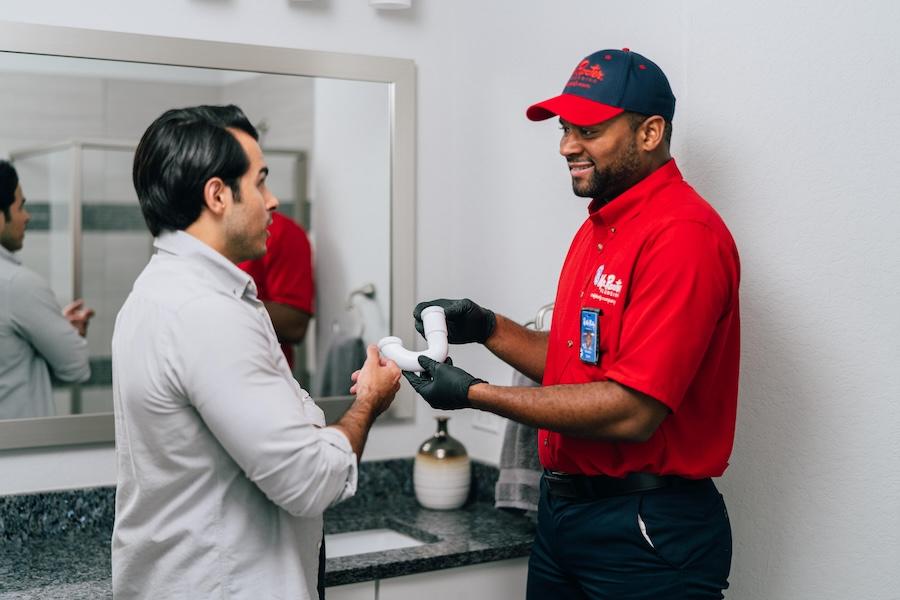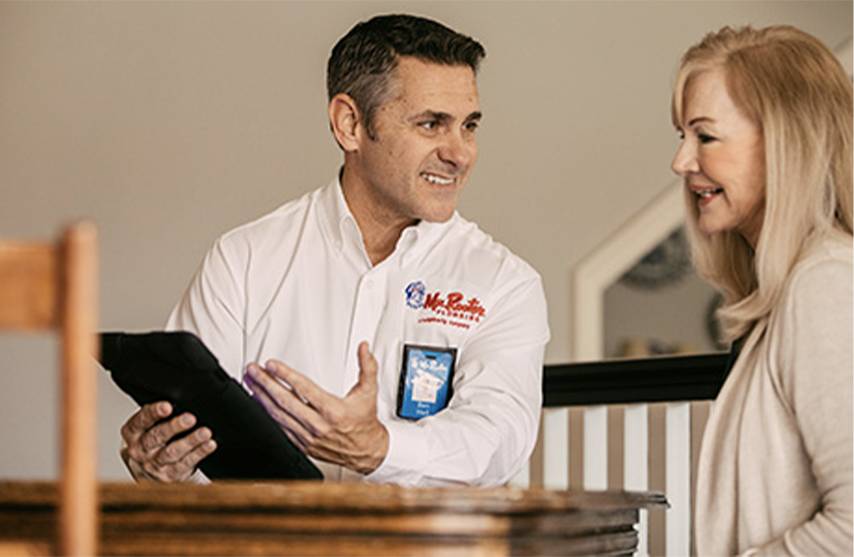
The bathroom is where mess builds up quickly, plumbing gets pushed to its limits, and smells have a way of lingering longer than they should. Most people put off scrubbing it down until something forces their hand, like a clogged toilet, slow drain, or guests coming over. Mr. Rooter Plumbing is here to save the day. A clean bathroom keeps your bathroom plumbing in good condition, cuts down on bacteria, and helps you catch signs of damage before you need a full plumbing repair service. Read more to find out how to clean your bathroom without overthinking it or letting it drag out for days.
Every bathroom has a high-traffic area that collects the most grime. Usually, it’s the toilet. You’ll need to clean the entire unit, including the bowl, base, seat, tank, and hinges. A simple toilet brush, a quality cleaner, and a pair of gloves can get the job done. Don’t spray and walk away. Let your cleaning solution sit for at least five minutes to break down buildup, then scrub with purpose. Next is the sink. A lot of residue can build up around the drain and faucet. Toothpaste spatter, soap scum, and hard water stains tend to cling to surfaces. Use a non-abrasive scrub and go for the small spots like the lip under the faucet, the base where grime hides, and the pop-up drain. A vinegar-and-baking-soda mix can help if your sink smells musty or drains slowly. Shower walls and tubs get overlooked because they don’t seem dirty at a glance. But soap residue, mildew, and hard water scale build up fast. Spray them down with a shower-specific cleaner or a vinegar-based solution, let it sit, and scrub with a sturdy brush. If you see pink or orange stains, you’re likely dealing with bacteria that feed on soap, which is another reason to clean consistently instead of waiting for it to get out of hand.
Grime collects where you stop paying attention. Light switches, door handles, cabinet knobs, and towel racks all need wiping down. They’re high-touch surfaces, but they go untouched during a routine cleaning. Wipe these with a disinfecting cloth or a mild soap solution. It should only take a few minutes. Mirrors should be the last step in your wipe-down process. Use a streak-free glass cleaner and a microfiber cloth. Go top to bottom in a circular motion instead of side to side. The floor is your final task. Once you’ve knocked dust and dirt down there while cleaning everything else, it’s best to save it for last. Start by vacuuming or sweeping. Then, mop with a cleaner suited for your flooring type. Get into corners and behind the toilet, where hair and dust like to hide. Don’t forget the trash can. Empty it, rinse it, and wipe it down.

You can avoid deep scrubbing if you keep things under control with consistent habits. Wipe the sink every night. Give the toilet a quick brush midweek. Keep a small spray bottle of vinegar in the shower to mist walls and prevent soap scum buildup. These tasks take less than five minutes and keep the big jobs from getting worse. Check for signs of slow drainage, unusual smells, or standing water as you go. These are early signals that something might be wrong. If your drain gurgles when water flows, it may mean there's a partial clog in your line. Don’t ignore moisture, either. Bathrooms without proper ventilation are breeding grounds for mold. Always run your fan during showers and leave the door open afterward to let the humidity out. If you see dark spots forming near the ceiling or in corners, take action before they spread. Replacing your shower curtain liner every few months is another easy win. Mildew builds up fast on vinyl liners, and most are cheap to replace. You can also toss fabric liners in the wash with hot water, vinegar, and baking soda.
Cleaning helps you stay ahead of problems, but it can’t fix every issue. If you’ve cleaned your sink and the smell still lingers, it might be coming from the drain line. The same goes for standing water in the shower or frequent toilet clogs. You might be dealing with a pipe blockage or buildup deeper in the system. A plumber can use inspection tools to check your lines for damage, grease buildup, or tree root intrusion. Trying to snake it yourself might work for a minor clog, but it can also push the blockage further or damage your pipes if you don’t know what you’re doing. Waiting can lead to water damage, expensive repairs, or the need for a more complicated plumbing repair service.
Cleaning your bathroom doesn’t have to be an all-day project. The more consistently you do it, the less effort it takes. If you’ve cleaned everything and still have leaks, smells, or drainage problems, call Mr. Rooter Plumbing. We offer dependable plumbing repair service that will keep your system working the way it should. Contact our team to learn more or to schedule an appointment with an experienced plumber in your neighborhood.